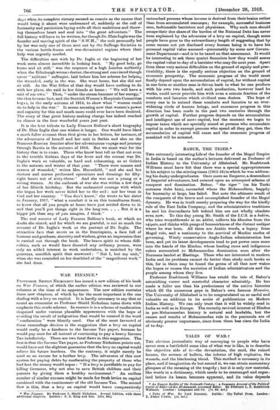WAR FINANCE.*
PROFESSOR SHIELD NICHOLSON has issued a new edition of his book on War Finance, of which the earlier edition was reviewed in our columns at the time of its appearance. The new edition contains three new chapters, of which by far the most important is the one dealing with a levy on capital. It is hardly necessary to say that so sound an economist as Professor Shield Nicholson turns down with emphasis this crude scheme. In essence it is a scheme of confiscation disguised under various plausible appearances with the 'hope of avoiding the revolt of indignation that would be created if the word " confiscation " were bluntly used. One of the most favoured of these camouflage devices is the suggestion that a levy on capital would really be a kindness to the Income Tax payer, because he would pay once for all instead of continuing to pay a heavy Income Tax indefinitely. There are two fatal flaws in this suggestion. The first is that the Income Tax payer, as Professor Nicholson points out, would have not the slightest guarantee that the levy on capital would relieve his future burdens. On the contrary, it might merely be used as an excuse for a further levy. The advocates of this new system for paying debts by confiscating the property of those who had lent the money would argue : "If a levy is justifiable to pay for killing Germans, why not also to save British children and their parents by giving them a healthy environment." An endless number of similar excuses might be made for fresh levies on capital combined with the continuance of the old Income Tax. The second flaw is this, that a levy on capital would leave comparatively •• War Finance. By Professor J. Shield Nicholson. Second Edition, with three additional chapters. London : 6. King and Son. (10s. ed.' untouched persons whose income is derived from their brains rather than from accumulated resoure.es; for example, successful business men, fashionable barristers and physicians. Why such men should escape their due share of the burden of the National Debt has never been explained by the advocates of a levy on capital, though some people have gone to the extraordinary length of suggesting that by some means not yet disclosed every human being is to have his personal capital value assessed—presumably by some new Govern- ment Department--and is to be taxed on that assessment. It would be interesting to ask these quaint financiers how they would assess the capital value to-day of a barrister who may die next year. Apart from these very serious difficulties on the ground of equity and prac- ticability, there is the equally serious objection on the ground of economic prosperity. The economic progress of the world must finally depend upon the accumulation of capital, for without capital in one form or another man is driven beak to what he can produce with his own two hands, and such production, however hard he works, could never provide him with even a minute fraction of the comforts and luxuries which civilized man desires. The hope of every one is to extend these comforts and luxuries to an ever- widening circle of human beings, and enormous progress in this direction has been made in the past two centuries through the growth of capital. Further progress depends on the accumulation and intelligent use of more capital, but the moment we begin to impose taxes which are specially aimed at persons who accumulate capital in order to exempt persons who spend all they get, then the accumulation of capital will cease and the economic progress of mankind will be arrested.


























 Previous page
Previous page